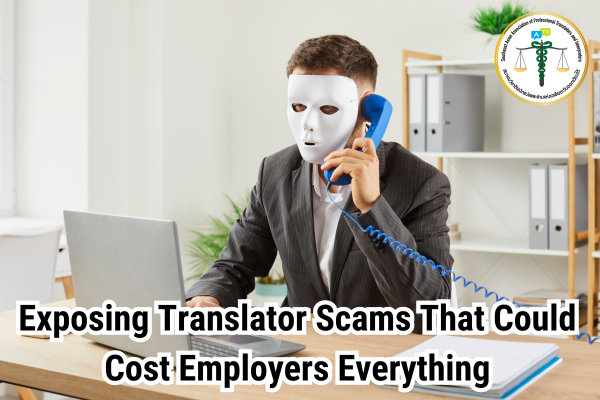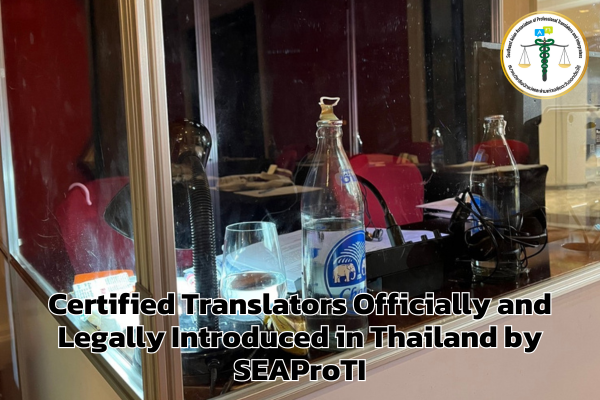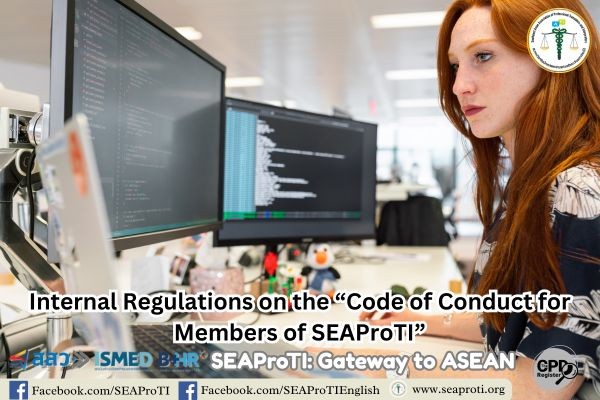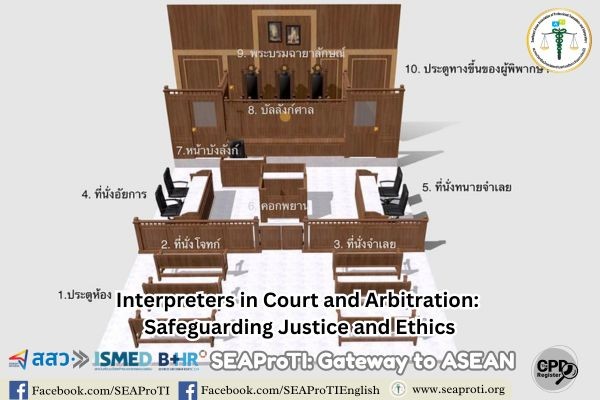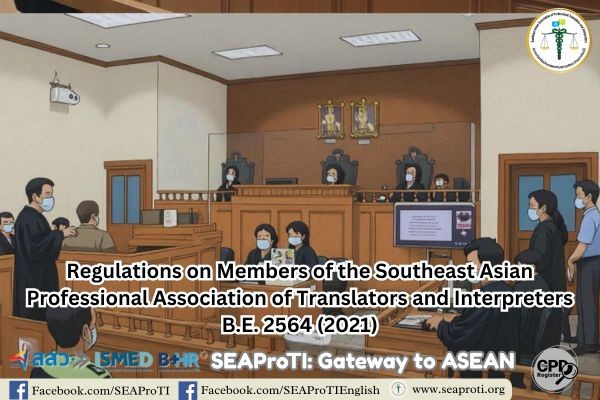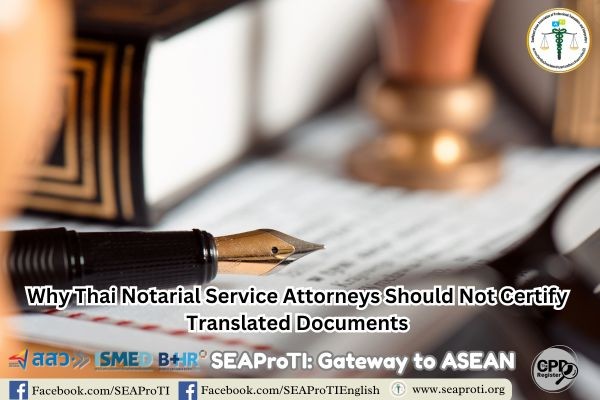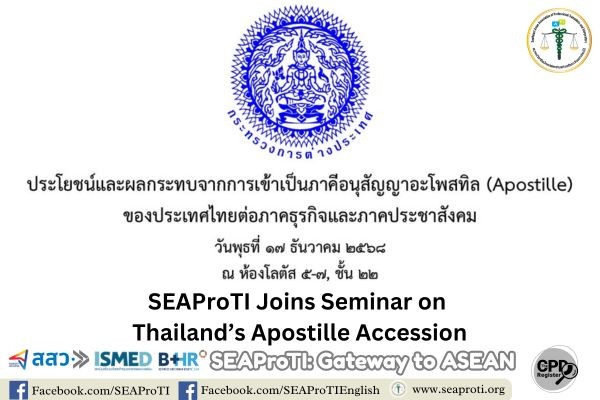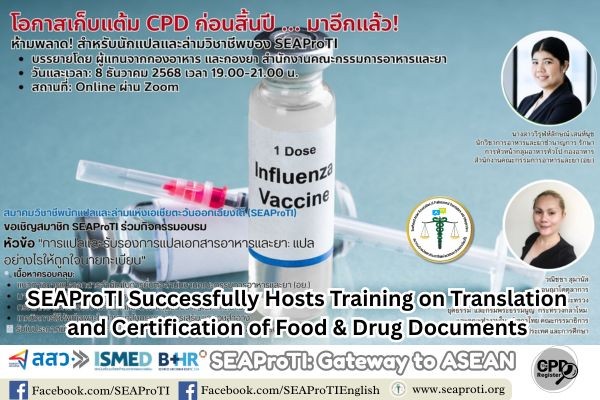“When Translation Becomes a Trap:
Exposing Translator Scams That Could Cost Employers Everything”
5 January 2025, Bangkok – In the world of multilingual communication, translators are the bridges that connect understanding across languages. But what happens when that bridge turns into a trap that leaves employers with significant losses? Some translators may not only deliver the words but also twist their employers’ intentions into personal gain through deceitful practices. This article uncovers various scams translators use to exploit employers, the devastating consequences, and practical steps to avoid falling victim.
The Most Dangerous Scams in the Translation Industry
When it comes to scams in the translation field, many may not imagine that translators, often perceived as professionals, could commit unethical acts. However, the reality is more alarming than expected. Common scams include:
1. Falsifying Qualifications
- Intentional Deception: Some translators claim expertise in specialized fields, such as legal, medical, or technical translation, even when they lack relevant experience. This false expertise is used to demand higher fees.
- Fake Certifications: Using forged certifications or diplomas, often acquired through illicit means, to create a false sense of credibility.
2. Misusing Technology
- Hiding the Truth: Translators might use machine translation software, such as Google Translate, without making any necessary corrections. However, they charge clients the full rate for manual translation.
- Artificial Intelligence (AI): Some rely entirely on AI tools to translate content without informing the employer, leading to inaccuracies and potential damage.
3. Double-Booking Assignments
- Divided Attention: Accepting multiple assignments from different sources simultaneously, which compromises the quality and timeliness of delivery.
- Unapproved Subcontracting: Outsourcing work to another translator without the employer’s consent but still charging full rates.
4. Breaching Confidentiality
- Selling Information: Disclosing sensitive information obtained through translation projects to third parties, including the employer’s competitors.
- Personal Misuse: Exploiting trade secrets or proprietary information for personal benefit.
5. Overcharging
- Inflated Word Counts: Reporting an exaggerated number of words or pages to charge higher translation fees.
- Fake Expenses: Claiming additional costs for software or equipment that were never actually used.
The Potential Consequences for Employers
Employers who fall victim to these scams may face severe repercussions, including:
- Financial Loss: Overpayment for services or fees that are not justified.
- Project Failure: Poor-quality translations or incomplete work can lead to lost clients or missed business opportunities.
- Legal Issues: Breaches of confidentiality or leaked information may result in unexpected lawsuits and reputational damage.
Chilling Case Studies
Falsified Certifications
A company in Thailand hired a translator claiming expertise in international law. Eventually, the company discovered significant inaccuracies in the translated documents, leading to legal disputes with overseas partners and financial losses amounting to millions.
Confidentiality Breach
A freelance translator was caught selling confidential product launch details to a competitor. The client lost its competitive advantage and became entangled in a prolonged legal battle.
How to Prevent Translator Scams
To avoid falling victim to these scams, employers should take the following precautions:
-
Choose Trusted Translators
- Verify the translator’s background and previous work thoroughly.
- Opt for translators certified by reputable professional organizations, such as SEAProTI in Thailand.
-
Establish Clear Contracts
- Draft contracts specifying the scope of work, confidentiality agreements, and penalties for damages.
- Include clauses prohibiting unauthorized subcontracting and ensuring the exclusivity of the work.
-
Review Delivered Work
- Use proofreaders to check the quality and accuracy of translations.
- Utilize software tools to verify word counts and prevent exaggerated claims.
-
Rely on Reputable Platforms
- Partner with agencies or platforms that rigorously screen translators and ensure quality assurance.
Conclusion: Beware, or You Could Be the Next Victim
Scams in the translation industry might be unexpected, but their consequences can be devastating. Employers must prioritize selecting qualified translators, thoroughly reviewing work, and implementing robust preventive measures. A small oversight can lead to immense losses that are difficult to recover.
About SEAProTI’s certified translators, translation certification providers, and certified interpreters:
The Southeast Asian Association of Professional Translators and Interpreters (SEAProTI) has officially announced the criteria and qualifications for individuals to register as “Certified Translators,” “Translation Certification Providers,” and “Certified Interpreters” under the association’s regulations. These guidelines are detailed in Sections 9 and 10 of the Royal Thai Government Gazette, issued by the Secretariat of the Cabinet under the Office of the Prime Minister of the Kingdom of Thailand, dated July 25, 2024, Volume 141, Part 66 Ng, Page 100.
To read the full publication, visit: the Royal Thai Government Gazette
เมื่อการแปลกลายเป็นกับดัก: เปิดโปงกลโกงนักแปลที่อาจทำให้นายจ้างสูญเสียทุกอย่าง
5 มกราคม 2568, กรุงเทพมหานคร – ในโลกของการสื่อสารข้ามภาษา นักแปลเปรียบเสมือนสะพานเชื่อมความเข้าใจ แต่จะเกิดอะไรขึ้นเมื่อสะพานนั้นกลายเป็นกับดักที่ทำให้นายจ้างต้องพบกับความสูญเสีย นักแปลบางรายอาจไม่ได้เพียงแค่แปลข้อความ แต่ยังแปลเจตนาของนายจ้างให้กลายเป็นผลประโยชน์ส่วนตัวโดยมิชอบ บทความนี้จะพาคุณไปเปิดโปงกลโกงหลากรูปแบบที่นักแปลใช้โกงนายจ้าง พร้อมทั้งผลกระทบอันเลวร้ายที่ตามมา และแนวทางป้องกันไม่ให้ตกเป็นเหยื่อ
กลโกงที่อันตรายที่สุดในวงการแปล
เมื่อพูดถึงกลโกงในวงการแปล หลายคนอาจนึกไม่ถึงว่านักแปลซึ่งดูเหมือนจะเป็นมืออาชีพ จะสามารถทำสิ่งที่ผิดศีลธรรมได้ แต่ความจริงนั้นน่ากลัวกว่าที่คิด! กลโกงที่พบบ่อย ได้แก่:
1. การปลอมแปลงคุณสมบัติ
- เจตนาหลอกลวง: นักแปลบางคนแอบอ้างว่ามีความเชี่ยวชาญเฉพาะทาง ทั้งที่ความจริงแล้วไม่มีประสบการณ์ในด้านนั้นเลย เช่น อ้างว่าเชี่ยวชาญด้านกฎหมาย การแพทย์ หรือเทคนิคพิเศษ เพียงเพื่อเรียกค่าจ้างสูงขึ้น
- ใบรับรองปลอม: ใช้ใบรับรองที่ปลอมแปลงขึ้น หรือซื้อขายผ่านตลาดมืด เพื่อสร้างความน่าเชื่อถือปลอมๆ
2. การใช้เทคโนโลยีในทางที่ผิด
- ซ่อนความจริง: ใช้ซอฟต์แวร์แปลภาษาอัตโนมัติ เช่น Google Translate โดยไม่ตรวจสอบแก้ไขให้เหมาะสม แต่เรียกเก็บค่าจ้างในอัตราของการแปลด้วยมือ
- ปัญญาประดิษฐ์ (AI): ใช้เครื่องมือ AI แปลข้อความทั้งหมดโดยไม่บอกให้นายจ้างทราบ ซึ่งผลลัพธ์อาจทำให้เนื้อหาแปลผิดพลาดอย่างร้ายแรง
3. การรับงานซ้ำซ้อน
- แบ่งสมาธิ: รับงานจากหลายแหล่งพร้อมกัน ทำให้ไม่สามารถส่งงานได้ตรงเวลา หรือคุณภาพของงานต่ำกว่าที่ตกลงไว้
- ส่งต่องานลับๆ: จ้างนักแปลอื่นทำงานแทนโดยไม่ได้รับอนุญาตจากนายจ้าง แต่ยังเรียกเก็บค่าจ้างเต็มจำนวน
4. การละเมิดความลับทางการค้า
- ขายข้อมูล: เปิดเผยข้อมูลที่ได้รับจากงานแปลให้บุคคลภายนอก หรือแม้กระทั่งคู่แข่งทางธุรกิจของนายจ้าง
- ใช้ข้อมูลในทางมิชอบ: นำข้อมูลสำคัญ เช่น ความลับทางการค้าไปใช้ประโยชน์ส่วนตัว
5. การเรียกเก็บค่าใช้จ่ายเกินจริง
- ตัวเลขที่เพิ่มขึ้นเอง: แจ้งจำนวนคำหรือหน้าของต้นฉบับเกินความเป็นจริงเพื่อเรียกเก็บค่าบริการสูงขึ้น
- ค่าใช้จ่ายปลอม: อ้างว่าเสียค่าซอฟต์แวร์หรือค่าอุปกรณ์เพิ่มเติม ทั้งที่ไม่ได้ใช้จริง
ผลกระทบที่อาจเกิดขึ้นกับนายจ้าง
นายจ้างที่ตกเป็นเหยื่อของกลโกงเหล่านี้ อาจต้องเผชิญผลกระทบที่หนักหนาสาหัส ไม่ว่าจะเป็น:
- ความเสียหายทางการเงิน: การจ่ายค่าบริการเกินจริง หรือค่าจ้างที่ไม่สมเหตุสมผล
- ความล้มเหลวในโครงการ: งานแปลที่ผิดพลาดหรือไม่สมบูรณ์อาจทำให้นายจ้างเสียลูกค้า หรือสูญเสียโอกาสทางธุรกิจ
- ปัญหาทางกฎหมาย: หากข้อมูลลับรั่วไหล นายจ้างอาจต้องเผชิญคดีความที่ไม่คาดคิด
กรณีตัวอย่างที่น่าขนลุก
กรณีปลอมแปลงใบรับรอง
บริษัทหนึ่งในประเทศไทยได้ว่าจ้างนักแปลที่อ้างว่ามีความเชี่ยวชาญด้านกฎหมายระหว่างประเทศ แต่ในที่สุดพบว่าเอกสารที่แปลมีความผิดพลาดอย่างร้ายแรง ส่งผลให้บริษัทต้องเผชิญข้อพิพาททางกฎหมายกับคู่ค้าในต่างประเทศ และสูญเสียเงินหลายล้านบาท
กรณีละเมิดความลับ
นักแปลอิสระรายหนึ่งถูกจับได้ว่าได้นำข้อมูลผลิตภัณฑ์ใหม่ที่ยังไม่ได้เปิดตัวของลูกค้าไปขายให้บริษัทคู่แข่ง ส่งผลให้ลูกค้าสูญเสียความได้เปรียบทางการตลาด และนำไปสู่การฟ้องร้องที่ยืดเยื้อ
แนวทางป้องกันกลโกงนักแปล
เพื่อหลีกเลี่ยงการตกเป็นเหยื่อของกลโกงเหล่านี้ นายจ้างควรดำเนินการดังนี้:
-
เลือกนักแปลที่มีความน่าเชื่อถือ
- ตรวจสอบประวัติและผลงานของนักแปลอย่างละเอียด
- ใช้บริการนักแปลที่ได้รับการรับรองจากสมาคมวิชาชีพ เช่น SEAProTI ในประเทศไทย
-
ทำสัญญาที่รัดกุม
- ระบุเงื่อนไขการว่าจ้าง ขอบเขตงาน และบทลงโทษในกรณีเกิดความเสียหาย
- เพิ่มข้อกำหนดเรื่องการรักษาความลับ และห้ามส่งต่องานให้ผู้อื่นโดยไม่ได้รับอนุญาต
-
ตรวจสอบผลงาน
- ใช้ผู้ตรวจแก้ไขงาน (Proofreader) เพื่อตรวจสอบคุณภาพของการแปล
- ใช้ซอฟต์แวร์ตรวจสอบจำนวนคำเพื่อป้องกันการแจ้งข้อมูลเท็จ
-
เลือกใช้ระบบกลางที่เชื่อถือได้
- ใช้แพลตฟอร์มหรือเอเจนซี่ที่มีชื่อเสียงและระบบคัดกรองนักแปลที่เข้มงวด
บทสรุป: ระวังให้ดี ไม่เช่นนั้นคุณอาจเป็นรายต่อไป
กลโกงในวงการแปลอาจเป็นเรื่องที่คาดไม่ถึง แต่ผลกระทบที่เกิดขึ้นสามารถสร้างความเสียหายได้มหาศาล นายจ้างทุกคนควรให้ความสำคัญกับการเลือกนักแปลที่มีคุณภาพ ตรวจสอบผลงานอย่างรอบคอบ และมีมาตรการป้องกันที่ชัดเจน เพราะเพียงความประมาทเล็กน้อย อาจนำไปสู่การสูญเสียครั้งใหญ่ที่ไม่มีวันแก้ไขได้
เกี่ยวกับนักแปลรับรอง ผู้รับรองการแปล และล่ามรับรองของสมาคมวิชาชีพนักแปลและล่ามแห่งเอเชียตะวันออกเฉียงใต้
สมาคมวิชาชีพนักแปลและล่ามแห่งเอเชียตะวันออกเฉียงใต้ (SEAProTI) ได้ประกาศหลักเกณฑ์และคุณสมบัติผู้ที่ขึ้นทะเบียนเป็น “นักแปลรับรอง (Certified Translators) และผู้รับรองการแปล (Translation Certification Providers) และล่ามรับรอง (Certified Interpreters)” ของสมาคม หมวดที่ 9 และหมวดที่ 10 ในราชกิจจานุเบกษา ของสำนักเลขาธิการคณะรัฐมนตรี ในสำนักนายกรัฐมนตรี แห่งราชอาณาจักรไทย ลงวันที่ 25 ก.ค. 2567 เล่มที่ 141 ตอนที่ 66 ง หน้า 100 อ่านฉบับเต็มได้ที่: นักแปลรับรอง ผู้รับรองการแปล และล่ามรับรอง


